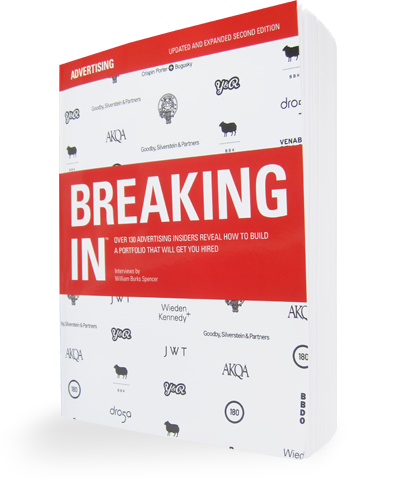If you missed it, check out some great work from Dylan Lee.
WS: What do you look for in a student book? And what impresses you?
DL: I look for big ideas. I don’t have to see digital. I don’t have to see TV. I don’t have to see alternative media. If someone has great ideas, I know he or she can think of something for whatever medium comes up. I also love to see a book where someone has multiple voices. Because sometimes funny works great. And sometimes it doesn’t. I am also always impressed by truths; those ideas resonate with consumers and go beyond gimmicks, word plays, and jokes.
WS: How important is finish? If ideas are the most important thing, can sketches be enough? Do you look at physical books anymore, or is it all websites?
DL: I want to say that I’m not affected by pretty books and execution. But it is advertising, and presentation is important. However, a good creative mind should and will see a good idea on a piece of toilet paper. If you have a great idea but not the time to make it look shiny, present it. As for websites, I’m torn. They make portfolios quick to view, omnipresent, and of course, “Everybody’s doing it!” But I fear they do a disservice to the work. TV spots, print ads, and out of home were not meant to be shrunken down and viewed on a tiny computer screen. For a copywriter, it’s sad to have well-crafted copy scrolled through in a way you would never read a real ad. I’m sure I’ll succumb, but I’ll always have a life-sized, tangible, more impressive book to show. We should make our ideas look amazing, captivating, and larger than life. Isn’t that what our jobs are?
WS: How important is writing? Do you need to see long copy?
DL: If you are a copywriter, you will write. I guarantee it. Sometimes short copy, sometimes long copy. TV scripts, radio, websites, Facebook ads. If you don’t have writing in your book—and I mean longer than a sentence or two—then you will run into problems in your career. I see juniors being hired who can’t form a sentence. Or write dialogue in scripts. Or write their way out of a cereal box. If you’re a copywriter, it will help if you love words. And well-written long copy means you’re in another class of writer.
WS: What do you think of showing work that is not advertising? Things like art, journal writing, photography, hobbies, etc.?
DL: I like this. A lot. It shows you’re not just about advertising—which will make you better at advertising. Advertising shouldn’t be formulaic. It’s great to see you can bring outside creativity into your work.

Comments are closed.